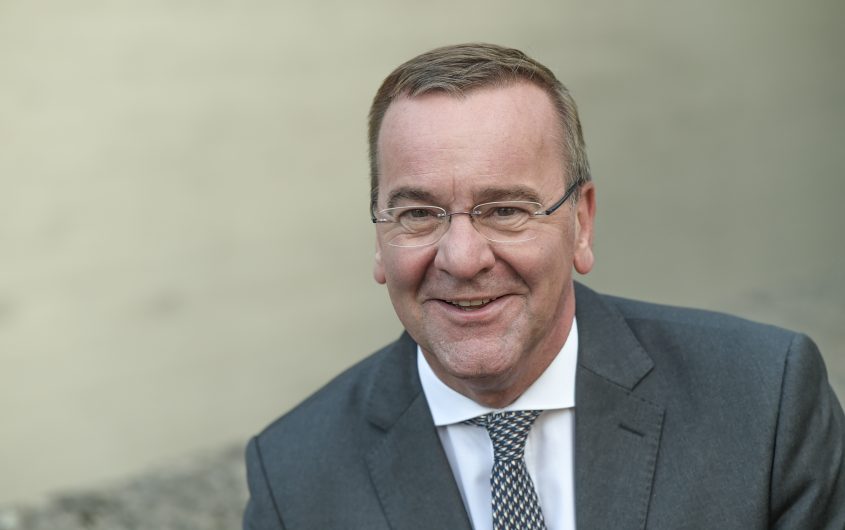
Daniel Biskup via Wikimedia Commons
AGI Profiles: Boris Pistorius

Joseph Vitale
AICGS/Halle Foundation Intern
Joseph Vitale is a research intern at AICGS for the spring of 2023. He assists resident fellows with their research projects, manages databases, and helps organize and document events.
Mr. Vitale is currently pursuing a master’s degree in German and European Studies at Georgetown University’s Walsh School of Foreign Service. He is concentrating his studies on issues related to transatlantic security and defense and is focusing his capstone project on Germany’s role in European security.
Mr. Vitale completed his undergraduate degree at Binghamton University in New York with a double major in history and German studies. He has also previously studied at both the Hertie School of Governance and Freie Universität in Berlin.
Federal Minister of Defense
Boris Pistorius currently serves as the German Federal Minister of Defense. Appointed by Chancellor Olaf Scholz on January 17, 2023, Pistorius succeeded Christine Lambrecht following her resignation. Prior to this announcement, Pistorius served as Minister for Interior and Sports of Lower Saxony from February 2013 until his appointment to Scholz’s cabinet.
Pistorius’ appointment as defense minister is his first national office position. He has a legal background with a political career focused on local and state politics.
Pistorius was born in Osnabrück, Lower Saxony. His mother, Ursula Pistorius, was a member of the Landtag of Lower Saxony from 1978 to 1990. In 1980, Boris was conscripted to military service in the Bundeswehr before returning to continue his law studies at the University of Münster and Osnabrück University.
Political Career
Following his studies, Pistorius began his career in local politics. A member of the Social Democratic Party since 1976, Pistorius worked as the personal advisor to previous State Minister for Interior of Lower Saxony Gerhard Glogowski during later-Chancellor Gerhard Schröder’s reign as Minister President of Lower Saxony. From 1995-1996, Pistorius served as the deputy head of Glogowski’s office. Beginning in 1996, Pistorius would serve as a councilor of the city of Osnabrück. As councilor, a position he would hold until 2013, his self-proclaimed political priority areas were finance and economic and urban development.
From 1999 to 2002, Pistorius served as Second Mayor for his home city of Osnabrück, before resigning for career reasons to head the “Schools and Sports” Department of Weser-Ems Regional Administration in Lower Saxony. Pistorius returned to the mayoral office as a Head Mayor of the city of Osnabrück from 2006 to 2013, after which he resigned to serve as the Lower Saxon Minister of the Interior and Sport.
As Minister of the Interior, Pistorius gained a reputation as a specialist in internal security. In an effort to combat the spread of political extremism, Pistorius called for a ban on the messaging app Telegram in Germany, should the app continue to ignore requests to help track down extremist content. In 2018, the far-right Alternative for Germany (AfD) disbanded its youth wings in Lower Saxony after Pistorius ordered police surveillance of the groups. Pistorius has also focused on combatting Islamic extremism; in 2017, Pistorius aided in the first deportation of German-born men whose parents are foreign after the arrest of two men suspected of planning a terror attack in Göttingen in support of the Islamic State. Elsewhere, he oversaw anti-terrorist raids throughout Lower Saxony, targeting Islamic extremist groups suspected of supporting the Islamic State. Pistorius’ focus on police reform, internal security, and combatting political extremism has led to some publications referring to him and his brash, no-nonsense personality as the “Red General.”
Role in the SPD
Pistorius ran against Scholz for the chairmanship of the SPD in 2019, following the resignation of Andrea Nahles. Pistorius, running alongside Saxony State Minister for Equality and Integration Petra Köpping, received 14.1 percent of the votes in the first round. While Scholz and Klara Geywitz advanced to the second round, they lost to Norbert Walter-Borjans and Saskia Esken with 45.33 percent of the vote. In their campaign, Pistorius and Köppig emphasized social cohesion, combatting climate change, and the importance of bridging the gaps between federal and local politics. Later, he helped negotiate the “Ampel” coalition by leading the SPD working group on refugees, migration, and integration.
Pistorius’ appointment as Federal Minister of Defense came as a surprise to many. For one, although he completed a year of military service (at the time the norm in West Germany), he has little other personal experience in the Bundeswehr. However, his emphasis on internal security and coordination with the armed forces in Lower Saxony leads some to believe he is nevertheless fit for the job. As Chancellor Scholz stated, “[Pistorius] is someone with an awful lot of experience in security policy, who has cooperated openly and closely in his previous role with the Bundeswehr and who possesses the strength and calm that one needs for such a great task.”
As newly-appointed defense minister, Pistorius’ track record of political views towards Russia has caused a slight media stir. Pistorius had previously served under Gerhard Schröder, well-known for his ties to Russian President Vladimir Putin and recently served in the German-Russian Parliamentary Friendship Group in the Bundesrat before its dissolution in April 2022. He had also opposed sanctions against Russia following the annexation of Crimea in 2014. However, Pistorius has condemned the Russian invasion and supported assisting Ukraine prior to his appointment, which has since been followed with action and indications of continued support for Kyiv.
Just hours after being thrust into the role during a divisive debate over the shipment of heavy tanks to Ukraine, Pistorius met with U.S. Secretary of Defense Lloyd Austin. While Pistorius restrained from agreeing to tank shipments in this meeting, Germany later approved Leopard shipments in an agreement which also saw the United States approve the supply of M1 Abrams tanks. Pistorius, with his reputation for being a no-nonsense straight-talker, has also publicly lamented the state of the Bundeswehr in harsher words that separate him from his predecessor. He has stated that the 100 billion euro special fund is no longer enough to cover its needs and has advised that Germany would also need to raise its annual regular defense spending. He noted that the government must replenish its own stocks after supplying 14 Leopard tanks to Ukraine, and he has even stated that the decision to reverse compulsory military service in 2011 was a mistake. Additionally, as the current debate of German military assistance now includes fighter jets, Pistorius stated that “Fighter aircrafts are much more complex systems than main battle tanks and have a completely different range and firepower. We would venture into dimensions that I would currently warn against.” However, Pistorius’s language also implies that his position could change in the future.
With the appointment of this no-nonsense “Red General,” whose prior political career has been centered on the state level, to Federal Minister of Defense, there are many questions concerning German support for Ukraine and the future of the Zeitenwende. However, it is clear that Pistorius is poised to separate himself and his position from his oft-criticized predecessors, hinting at a new role for the Minister of Defense in Scholz’s government.








